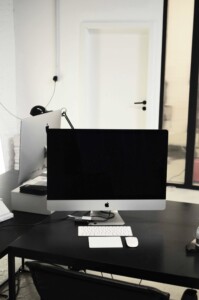 Occasionally I read Feng Shui articles written by others and often I disagree with the content of the article. One pervasive problem on-line is the mountain of articles written by people who are not even Feng Shui consultants, rather individuals just trying to sell a design or décor product in the name of good Feng Shui.
Occasionally I read Feng Shui articles written by others and often I disagree with the content of the article. One pervasive problem on-line is the mountain of articles written by people who are not even Feng Shui consultants, rather individuals just trying to sell a design or décor product in the name of good Feng Shui.
I reviewed one article which stated that one should NEVER sit in direct alignment with a door, as the “bad” energies will overwhelm the person in this position. The first tip-off that the article was not written by a quality source is the erroneous assumption that all air currents (qi) entering a room will affect someone negatively if the alignment to the door is direct.
What about GOOD energy entering a room and the person inside being able to take advantage of that flow? Yes, it is possible! And only a highly trained professional will know the difference. With so many contradictions of what to do and not to do in an office format, it can truly be confusing to the consumer. There is also the real fact that many office spaces are so small that a person cannot avoid sitting partially or directly in alignment with the room’s door. And which is worse: to face a door or have your back to a floor-to-ceiling window?
A good consultant will always take the list of pros and cons into consideration. While it may not be ideal to face a door directly, it is almost always worse to have one’s back to the door in a commercial environment. This is because there are too many instances where a person may feel a lack of privacy or caught off guard when there is a regular flow of people entering one’s office. That said, having your back to the door in your home office is not necessarily going to be jarring or make you unproductive. If you work from home, alone, no one is going to bother you. Having your back to a large window is not ideal, but generally better than a room with no window at all.
An office door that is aligned with a very long hallway will receive more energy (good or bad, to be determined based on other factors) than a door which is not directly at the end of a long hallway. This is like a micro-version of a house that sits at the end of a cul-de-sac. Additionally, the person’s birth data could easily be more important in determining desk orientation than the location of the door. Everyone, based on year of birth has both productive and unproductive directions to face when working or trying to concentrate. This is a very relevant aspect to factor in when reviewing any office space.
Author: Kartar Diamond
Company: Feng Shui Solutions ®
From the Architecture and Design Blog Series
